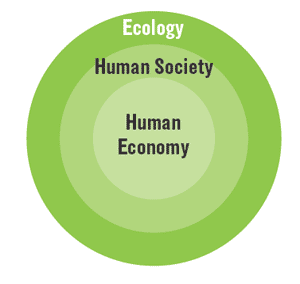Sustainability Context- Economy within Society within Ecology

Ecology-from the Greek oikos or house. The natural world that humans share with all creatures.
Human Society – from the Latin socius or companion. The sum of human activity and conditions that function as an inter – connected whole.
Human Economy-from the Greek oikonomia or household management. The wealth and resources of a community and how they are organized to meet peoples’ needs.
The Venn diagram at right shows that the human economy is embedded within society. In the words of Karl Polanyi, one of the world’s most original and influential economic historians, “man’s economy is submerged in his social relationships.“1 In Polanyi’s economic view, people are not simple, rational actors who are motivated to further their self-interest through the accumulation of material goods; rather, people act to safeguard their “social assets.” Material assets are only of value in so far as they protect social assets-the mutually beneficial relationships that bind people to one another. In other words, the human economic system is run on the basis of non-economic or social motives.
This view is confirmed by the most recent scientific research, in the multi-disciplinary field known as “evolutionary psychology”:
The primary adaptation of our species is not hunting, tool making, or language, but our ability to co-operate. While the process of evolution is often character- ized in terms of dog-eat-dog competition and the ‘survival of the fittest,’ this recent research reveals that our species’ success over the eons is due to the fact that we are the most co-operative creatures on the Earth.2
Of course, for the nearly one billion people who are members of co-operatives around the world, this is not surprising. They have each determined, individually, that their needs can be more effectively fulfilled by co-operating socially and economically with others rather than competing against them.
Human society is represented by the second circle and is embedded within the ecology-the entire natural world, or the earth. Today, we are rediscovering what our tribal ancestors always knew-that we are only a part of nature, we are not separate from or above nature. The ancient Greeks understood this when they created the words, “ecology” and “economy.” Ecology, oikos or house, is our collective house (the world), as well as our individual homes. Economy, oikonomia or household management, is the management of our individual homes, and our collective house (our communities and the earth).
While the business pages of our newspapers would like us to think of the economy as the “industrial, technological, or financial” economy, Wendell Berry sides with the Ancient Greeks when he talks about the “Great Economy.“3 For Berry, the Great Economy sustains the total web of life-all the other creatures with whom humans share the world.
-Russ Christianson
1. Karl Polanyi, The Great Transformation -The Political and Economic Origins of Our Time. Boston: Beacon Press, 1944, 1957, 2000, page 48.
2. William F. Allman, The Stone Age Present. New York: Simon and Schuster, 1994, pages 14, 21.
3. Herman E. Daly and John B. Cobb Jr., For the Common Good. Boston: Beacon Press, 1989, page 18.
***
Russ Christianson lives in Campbellford, Ontario and has worked with Canadian co-operatives for many years. His “Sustainability Scorecard” and related documents in the same edition of Cooperative Grocer are intended for shared public use (russ.c@xplornet.com; 705-653-0527).







